Describe the Cycle of Silver From Britain to China and Back to Britain Again
The Opium Wars in the mid-19th century were a disquisitional juncture in modern Chinese history. The start Opium War was fought betwixt China and Great Britain from 1839 to 1842. In the second Opium War, from 1856 to 1860, a weakened People's republic of china fought both Great Britain and France. Mainland china lost both wars. The terms of its defeat were a biting pill to swallow: China had to cede the territory of Hong Kong to British control, open treaty ports to merchandise with foreigners, and grant special rights to foreigners operating inside the treaty ports. In addition, the Chinese government had to stand past as the British increased their opium sales to people in China. The British did this in the name of free merchandise and without regard to the consequences for the Chinese government and Chinese people.
The lesson that Chinese students learn today nigh the Opium Wars is that People's republic of china should never once more permit itself become weak, 'backward,' and vulnerable to other countries. As i British historian says, "If you talk to many Chinese nigh the Opium War, a phrase you will rapidly hear is 'luo hou jiu yao ai da,' which literally ways that if you are backward, you will have a beating."1
Two Worlds Collide: The First Opium War
In the mid-19th century, western purple powers such as Groovy Uk, France, and the United States were aggressively expanding their influence around the world through their economic and war machine strength and past spreading religion, generally through the activities of Christian missionaries. These countries embraced the idea of complimentary trade, and their militaries had become then powerful that they could impose such ideas on others. In one sense, Red china was relatively constructive in responding to this foreign encroachment; unlike its neighbours, including nowadays-day India, Burma (now Myanmar), Malaya (now Malaysia), Indonesia, and Vietnam, Communist china did not become a full-fledged, formal colony of the West. In addition, Confucianism, the system of beliefs that shaped and organized Cathay's culture, politics, and social club for centuries, was secular (that is, not based on a organized religion or belief in a god) and therefore was not necessarily an obstacle to science and modernity in the ways that Christianity, Islam, and Hinduism sometimes were in other parts of the earth.
But in another sense, China was not constructive in responding to the "modern" West with its growing industrialism, mercantilism, and armed services force. Nineteenth-century Prc was a large, by and large land-based empire (see Map ane), administered past a c. two,000-year-erstwhile bureaucracy and dominated past centuries old and conservative Confucian ideas of political, social, and economic management. All of these things fabricated China, in some ways, dramatically different from the European powers of the day, and it struggled to deal effectively with their inroad. This ineffectiveness resulted in, or at least added to, longer-term problems for China, such every bit diff treaties (which volition exist described later), repeated strange military invasions, massive internal rebellions, internal political fights, and social upheaval. While the commencement Opium State of war of 1839–42 did not cause the eventual collapse of People's republic of china'south v,000-year imperial dynastic system seven decades later on, it did help shift the balance of ability in Asia in favour of the West.
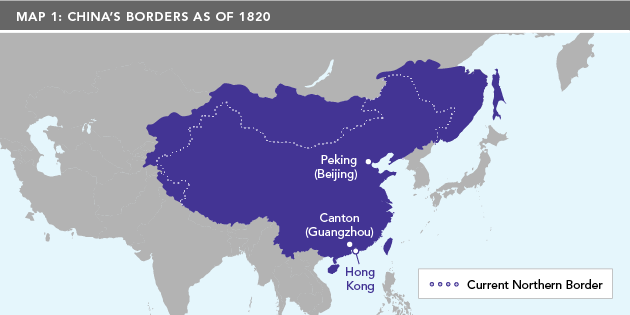 Map 1: Cathay's Borders as of 1820.
Map 1: Cathay's Borders as of 1820.
Opium and the West'south Cover of Free Trade
In the decades leading upwards to the first Opium State of war, trade between China and the West took place within the confines of the Canton System, based in the southern Chinese city of Guangzhou (also referred to as Canton). An earlier version of this organization had been put in identify by Red china under the Ming Dynasty (1368–1644), and farther developed by its replacement, the Qing Dynasty, likewise known every bit the Manchu Dynasty. (The Manchus were the ethnic grouping that ruled China during the Qing catamenia.) In the year 1757, the Qing emperor ordered that Guangzhou/Canton would be the just Chinese port that would be opened to trade with foreigners, and that trade could take place but through licensed Chinese merchants. This finer restricted strange trade and subjected it to regulations imposed by the Chinese government.
For many years, Great U.k. worked inside this organization to run a iii country trade operation: It shipped Indian cotton and British silver to China, and Chinese tea and other Chinese goods to Uk (see Map two). In the 18th and early 19th centuries, the balance of trade was heavily in China's favour. I major reason was that British consumers had developed a strong liking for Chinese tea, as well equally other goods similar porcelain and silk. Only Chinese consumers had no similar preference for any goods produced in Britain. Because of this trade imbalance, Britain increasingly had to apply silver to pay for its expanding purchases of Chinese appurtenances. In the late 1700s, Britain tried to alter this balance by replacing cotton wool with opium, also grown in India. In economical terms, this was a success for Britain; past the 1820s, the residue of merchandise was reversed in Britain's favour, and information technology was the Chinese who now had to pay with silver.
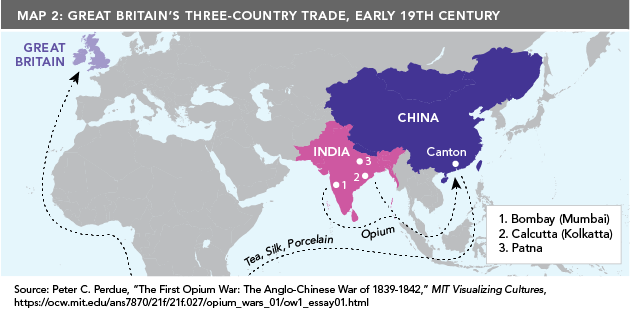 Map 2: Not bad United kingdom of great britain and northern ireland's Three-Land Merchandise, Early 19th Century.
Map 2: Not bad United kingdom of great britain and northern ireland's Three-Land Merchandise, Early 19th Century.
Effigy 1: A "stacking room" in an opium factory in Patna, India. On the shelves are assurance of opium that were role of United kingdom's trade with Red china.
The Scourge and Profit of Opium
The opium that the British sold in Mainland china was made from the sap of poppy plants, and had been used for medicinal and sometimes recreational purposes in China and other parts of Eurasia for centuries. Afterward the British colonized big parts of India in the 17th century, the British Eastward Republic of india Company, which was created to have advantage of trade with East Asia and India, invested heavily in growing and processing opium, especially in the eastern Indian province of Bengal. In fact, the British developed a assisting monopoly over the cultivation of opium that would exist shipped to and sold in People's republic of china.
By the early 19th century, more and more Chinese were smoking British opium as a recreational drug. But for many, what started as recreation presently became a punishing addiction: many people who stopped ingesting opium suffered chills, nausea, and cramps, and sometimes died from withdrawal. Once addicted, people would often do most annihilation to go on to get admission to the drug. The Chinese regime recognized that opium was condign a serious social problem and, in the yr 1800, it banned both the production and the importation of opium. In 1813, it went a step farther past outlawing the smoking of opium and imposing a penalisation of chirapsia offenders 100 times.
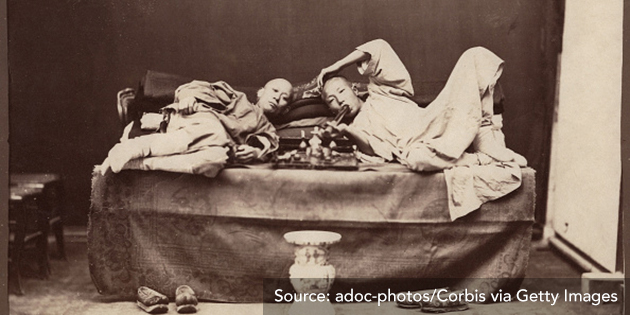 Figure ii: Opium smoking in China.
Figure ii: Opium smoking in China.
In response, the British East Bharat Company hired private British and American traders to transport the drug to Cathay. Chinese smugglers bought the opium from British and American ships anchored off the Guangzhou coast and distributed information technology within China through a network of Chinese middlemen. Past 1830, there were more than 100 Chinese smugglers' boats working the opium merchandise.
This reached a crisis point when, in 1834, the British Eastward India Company lost its monopoly over British opium. To compete for customers, dealers lowered their selling toll, which made it easier for more than people in China to purchase opium, thus spreading further use and add-on.
In less than 30 years—from 1810 to 1838—opium imports to China increased from 4,500 chests (the large containers used to ship the drug) to 40,000. Equally Chinese consumed more than and more than imported opium, the outflow of silvery to pay for it increased, from about two million ounces in the early 1820s to over ix 1000000 ounces a decade later. In 1831, the Chinese emperor, already angry that opium traders were breaking local laws and increasing habit and smuggling, discovered that members of his army and government (and even students) were engaged in smoking opium.
The Users Versus Pushers Argue
By 1836, the Chinese regime began to get more serious almost enforcing the 1813 ban. It closed opium dens and executed Chinese dealers. Just the problem simply grew worse. The emperor chosen for a debate amongst Chinese officials on how best to deal with the crisis. Stance were polarized into two sides.
1 side took a pragmatic approach (that is, an approach not focused on the morality of the issue). It focused on targeting opium users rather than opium producers. They argued that the production and sale of opium should be legalized so taxed past the government. Their belief was that taxing the drug would make it so expensive that people would have to fume less of it or not smoke information technology at all. They also argued that the money nerveless from taxing the opium merchandise could help the Chinese government reduce acquirement shortfalls and the outflow of silver.
Another side vehemently disagreed with this 'businesslike' approach. Led by Lin Zexu, a very capable and ambitious Chinese government official, they argued that the opium trade was a moral issue, and an "evil" that had to exist eliminated by whatever means possible. If they could not suppress the trade of opium and habit to it, the Chinese empire would have no peasants to work the land, no townsfolk to pay taxes, no students to report, and no soldiers to fight. They argued that instead of targeting opium users, they should end and punish the "pushers" who imported and sold the drug in China.
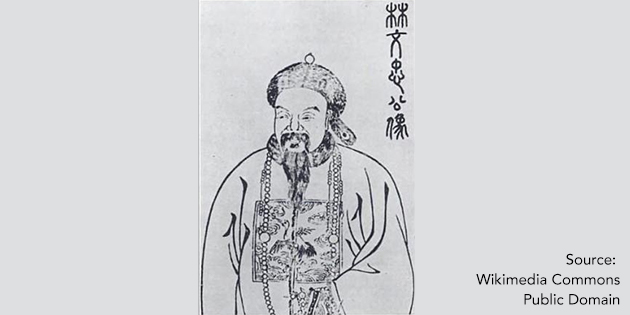 Figure 3: Lin Zexu.
Figure 3: Lin Zexu.
In the terminate, Lin Zexu's side won the argument. In 1839, he arrived in Guangzhou (Canton) to supervise the ban on the opium merchandise and to cleft downwards on its apply. He attacked the opium trade on several levels. For instance, he wrote an open letter to Queen Victoria questioning Britain'southward political support for the trade and the morality of pushing drugs. More importantly, he made rapid progress in enforcing the 1813 ban past absorbing over 1,600 Chinese dealers and seizing and destroying tens of thousands of opium pipes. He also demanded that foreign companies (British companies, in particular) turn over their supplies of opium in substitution for tea. When the British refused to exercise and then, Lin stopped all strange trade and quarantined the area to which these foreign merchants were bars.
After vi weeks, the strange merchants gave in to Lin'southward demands and turned over 2.6 million pounds of opium (over xx,000 chests). Lin'southward troops besides seized and destroyed the opium that was beingness held on British ships—the British superintendent claimed these ships were in international waters, merely Lin claimed they were anchored in and around Chinese islands. Lin then hired 500 Chinese men to destroy the opium by mixing it with lime and table salt and dumping it into the bay. Finally, he pressured the Portuguese, who had a colony in nearby Macao, to expel the uncooperative British, forcing them to move to the island of Hong Kong.
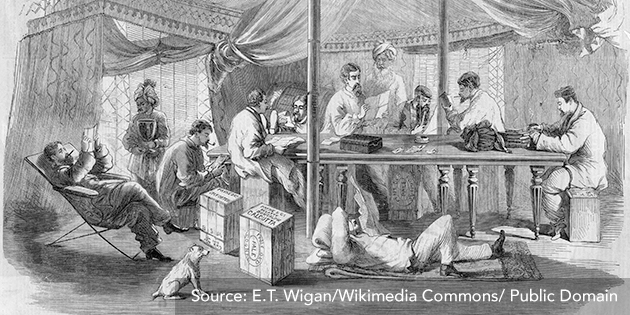 Figure 4: British officers in their tent during the starting time Opium War, circa 1839.
Figure 4: British officers in their tent during the starting time Opium War, circa 1839.
Taken together, these actions raised the tensions that led to the outbreak of the first Opium State of war. For the British, Lin's destruction of the opium was an affront to British dignity and their concepts of trade. Many British merchants, smugglers, and the British East India Visitor had argued for years that China was out of affect with "civilized" nations, which practised free trade and maintained "normal" international relations through consular officials and treaties. More to the betoken, British representatives in Guangzhou requested that merchants turn over their opium to Lin, guaranteeing that the British government would compensate them for their losses. The idea was that in the short term, this would forbid a major disharmonize, and that information technology would go along the merchants and transport captains safety while reopening the extremely profitable Red china trade in other goods. The huge opium liability (the opium was worth millions of pounds sterling), and increasingly shrill demands from merchants in China, Republic of india, and London when they discovered their profits were destroyed, gave politicians in United kingdom of great britain and northern ireland the excuse they were looking for to deed more forcefully to expand British imperial interests in China. War broke out in November 1839 when Chinese warships clashed with British merchantmen.
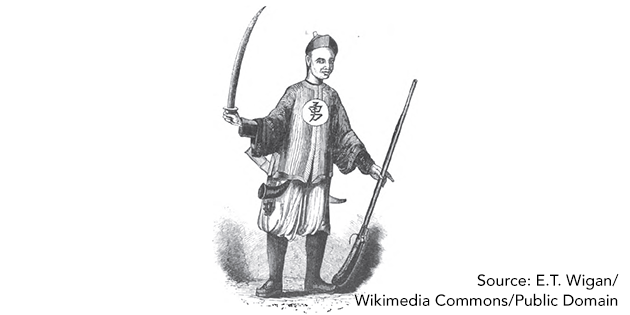 Figure five: Chinese swordsman, 1844.
Figure five: Chinese swordsman, 1844.
In June 1840, 16 British warships and merchantmen—many leased from the principal British opium producer, Jardine Matheson & Co.—arrived at Guangzhou. Over the next two years, the British forces bombarded forts, fought battles, seized cities, and attempted negotiations. A preliminary settlement called for China to sacrifice Hong Kong to the British Empire, pay an indemnity, and grant Britain full diplomatic relations. It likewise led to the Qing government sending Lin Zexu into exile. Chinese troops, using antiquated guns and cannons, and with limited naval ships, were largely ineffective confronting the British. Dozens of Chinese officers committed suicide when they could not repel the British marines, steamships, and merchantmen.
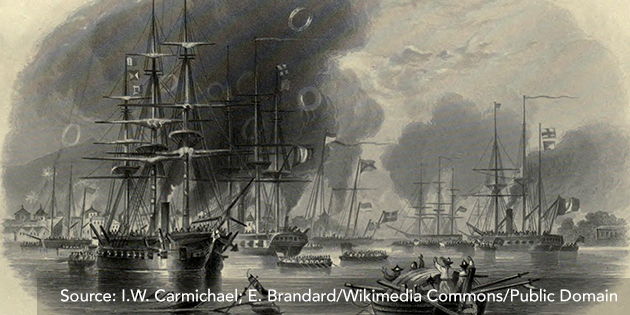 Figure 6: The British battery of Guangzhou/Canton.
Figure 6: The British battery of Guangzhou/Canton.
The State of war's Backwash
The commencement Opium War ended in 1842, when Chinese officials signed, at gunpoint, the Treaty of Nanjing. The treaty provided extraordinary benefits to the British, including:
- an excellent deep-water port at Hong Kong;
- a huge indemnity (compensation) to be paid to the British authorities and merchants;
- five new Chinese treaty ports at Guangzhou (Canton), Shanghai, Xiamen (Amoy), Ningbo, and Fuzhou, where British merchants and their families could reside;
- extraterritoriality for British citizens residing in these treaty ports, meaning that they were subject to British, not Chinese, laws; and
- a "near favoured nation" clause that any rights gained by other strange countries would automatically apply to Great United kingdom of great britain and northern ireland as well.
For Red china, the Treaty of Nanjing provided no benefits. In fact, Chinese imports of opium rose to a peak of 87,000 chests in 1879 (see Figure i). After that, imports of opium declined, and and then ended during the Get-go World State of war, equally opium production within Cathay outgrew foreign production. All the same, other merchandise did not aggrandize every bit much every bit foreign merchants had hoped, and they continued to blame the Chinese government for this. Among Chinese officials, the aftermath of the war led to a bitter political struggle between two factions: a peace faction, which was roughly aligned with the 'users' faction in the opium merchandise debate; and a 'war' faction, which was roughly aligned with the 'pushers' faction in that argue. The peace faction was in nominal control.
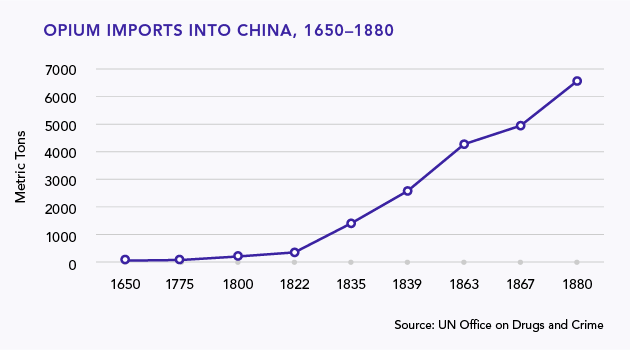 Figure 7: Opium War Imports into China, 1650-1880.
Figure 7: Opium War Imports into China, 1650-1880.
In addition, the Treaty of Nanjing ended the Canton Arrangement that had been in identify since the 17th century. This was followed in 1844 past a system of unequal treaties between People's republic of china and western powers. Through the well-nigh favoured nation clauses, these treaties allowed westerners to build churches and spread Christianity in the treaty ports. Western imperialism and free trade had its beginning bang-up victory in People's republic of china with this war and its resulting treaties.
When the Chinese emperor died in 1850, his successor dismissed the peace faction in favour of those who had supported Lin Zexu. The new emperor tried to bring Lin dorsum from exile, but Lin died forth the way. The Chinese court kept finding excuses not to have foreign diplomats at the upper-case letter city of Beijing, and its compliance with the treaties fell far short of western countries' expectations.
Second Opium War (1856–1860)
In 1856, a 2nd Opium War bankrupt out and continued until 1860, when the British and French captured Beijing and forced on Red china a new round of diff treaties, indemnities, and the opening of 11 more treaty ports (see Map 3). This also led to increased Christian missionary piece of work and legalization of the opium trade.
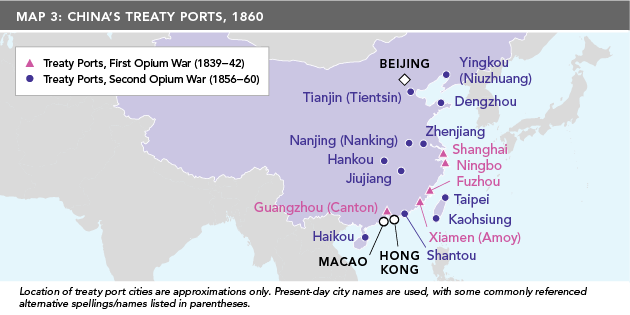 Map 3: China's Treaty Ports, 1860.
Map 3: China's Treaty Ports, 1860.
Even though new ports were opened to British merchants afterward the outset Opium War, the Chinese dragged their feet on implementing the agreements, and legal trade with Cathay remained limited. British merchants pressed their authorities to do more than, but the authorities's hands were tied because the Chinese regime in the capital metropolis of Beijing restricted who it met with.
In Oct 1856, Chinese authorities arrested the Chinese crew of a send operated by the British. The British used this as an opportunity to pressure China militarily to open itself up even further to British merchants and trade. France, using the execution in People's republic of china of a French Christian missionary as an excuse, joined the British in the fight. Joint French-British forces captured Guangzhou before moving north to the urban center of Tianjin (also referred to equally Tientsin). In 1858, the Chinese agreed—on newspaper—to a series of western demands independent in documents like the Treaty of Tientsin. But and so they refused to ratify the treaties, which led to further hostilities.
In 1860, British and French troops landed nigh Beijing and fought their way into the city. Negotiations quickly broke down and the British High Commissioner to China ordered the troops to loot and destroy the Imperial Summer Palace, a complex and garden where Qing Dynasty emperors had traditionally handled the country'due south official matters.
Before long afterward that, the Chinese emperor fled to Manchuria in northeast China. His brother negotiated the Convention of Beijing, which, in improver to ratifying the Treaty of Tientsin, added indemnities and ceded to Britain the Kowloon Peninsula across the strait from Hong Kong. The state of war ended with a profoundly weakened Qing Dynasty that was at present confronted with the demand to rethink its relations with the outside world and to modernize its military, political, and economic structures.
Thinking Nigh the Opium State of war
In 1839, the British imposed on Cathay their version of free trade and insisted on the legal right of their citizens (that is, British citizens) to do what they wanted, wherever they wanted. Chinese critics point out that while the British made lofty arguments about the 'principle' of free trade and individual rights, they were in fact pushing a product (opium) that was illegal in their own state.
There are different viewpoints on what was the master underlying factor in United kingdom of great britain and northern ireland'south interest in the Opium Wars. Some in the westward claim that the Opium Wars were about upholding the principle of free trade. Others, however, say that U.k. was acting more in the interest of protecting its international reputation while information technology was facing challenges in other parts of the world, such as the Near Due east, India, and Latin America. Some American historians accept argued that these conflicts were not so much most opium equally they were about western powers' desire to expand commercial relations more than broadly and to do away with the County trading system. Finally, some western historians say the war was fought at least partly to go along China's residue of trade in a deficit, and that opium was an effective fashion to do that, even though it had very negative impacts on Chinese society.
It is important to betoken out that not everyone in Britain supported the opium trade in China. In fact, members of the British public and media, every bit well equally the American public and media, expressed outrage over their countries' back up for the opium merchandise.2
From China's historical perspective, the beginning Opium War was the beginning of the end of late Imperial Mainland china, a powerful dynastic system and advanced civilization that had lasted thousands of years. The war was also the first salvo in what is now referred to in China as the "century of humiliation." This humiliation took many forms. Cathay's defeat in both wars was a sign that the Chinese state's legitimacy and ability to project power were weakening. The Opium Wars further contributed to this weakening. The unequal treaties that western powers imposed on Cathay undermined the ways China had conducted relations with other countries and its trade in tea. The continuation of the opium trade, moreover, added to the cost to China in both argent and in the serious social consequences of opium habit. Furthermore, the many rebellions that bankrupt out inside China after the kickoff Opium War made it increasingly difficult for the Chinese regime to pay its tax and huge indemnity obligations.
Present-day Chinese historians see the Opium Wars as a wars of aggression that led to the difficult lesson that "if you are 'backward,' you will accept a beating." These lessons shaped the rationale for the Chinese Revolution against imperialism and feudalism that emerged, and then succeeded, decades later.
About the Author
Jack Patrick Hayes, PhD, is a professor of Chinese and Japanese history at Kwantlen Polytechnic University in Vancouver. His research focuses on late regal and modern Chinese and Tibetan environmental history, resource development, and ethnic relations in western People's republic of china.
End Notes:
1 Andrew Moody, "Lessons of the Opium War," China Daily, February 24, 2012, http://us.chinadaily.com.cn/weekly/2012-02/24/content_14681839.htm.
2 See, for example, Peter Perdue, "The Starting time Opium War: The Anglo-Chinese War of 1839-1842," MIT Visualizing Cultures, p. 29, https://ocw.mit.edu/ans7870/21f/21f.027/opium_wars_01/ow1_essay01.html.
moralesexpearl1964.blogspot.com
Source: https://asiapacificcurriculum.ca/learning-module/opium-wars-china
0 Response to "Describe the Cycle of Silver From Britain to China and Back to Britain Again"
Postar um comentário